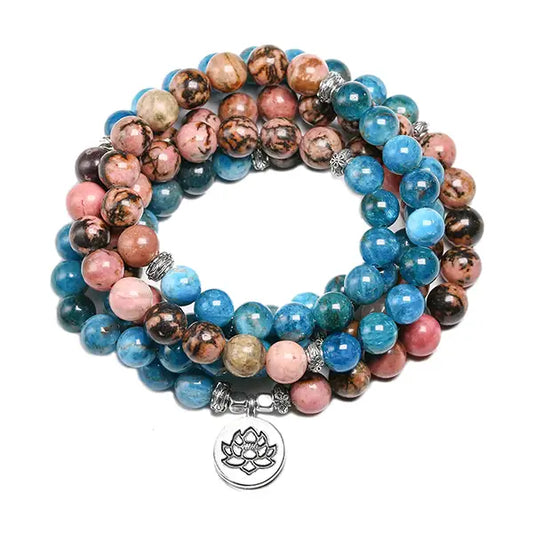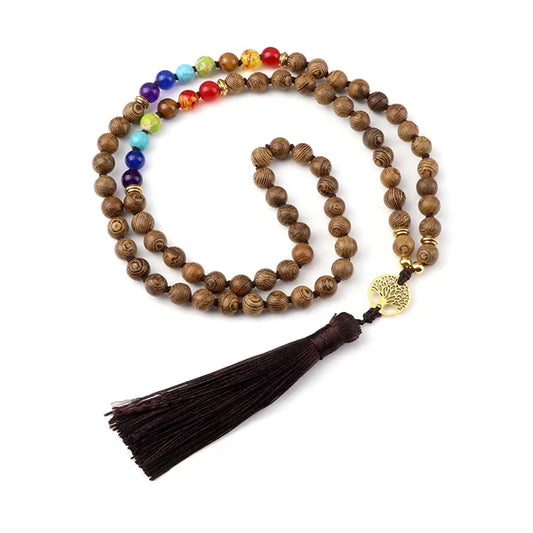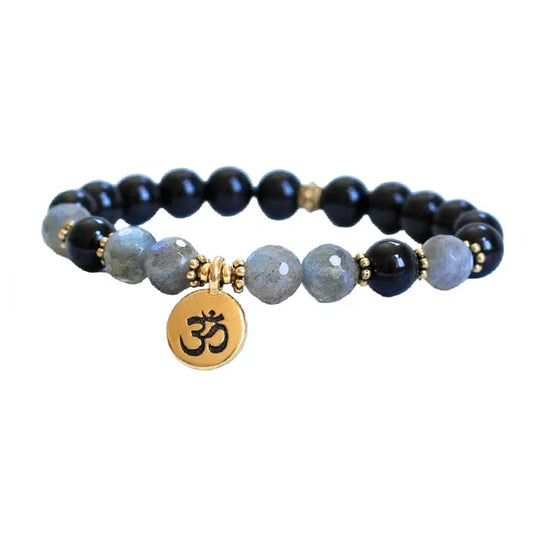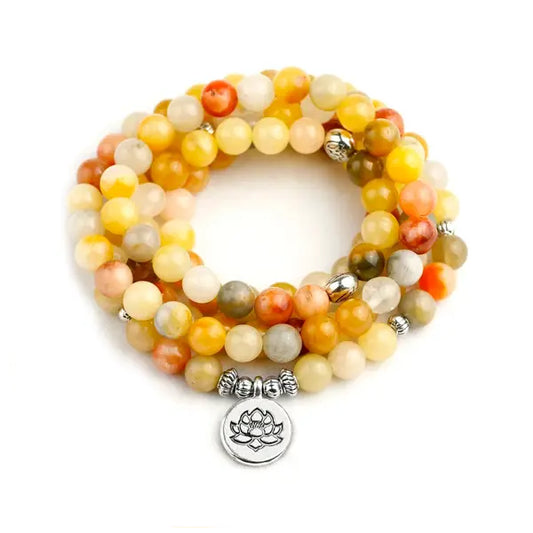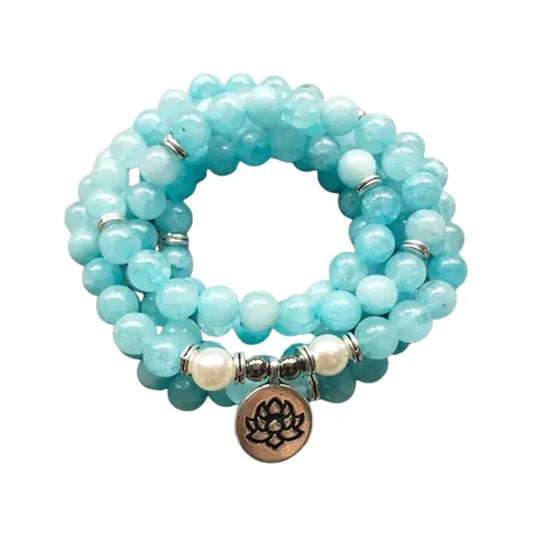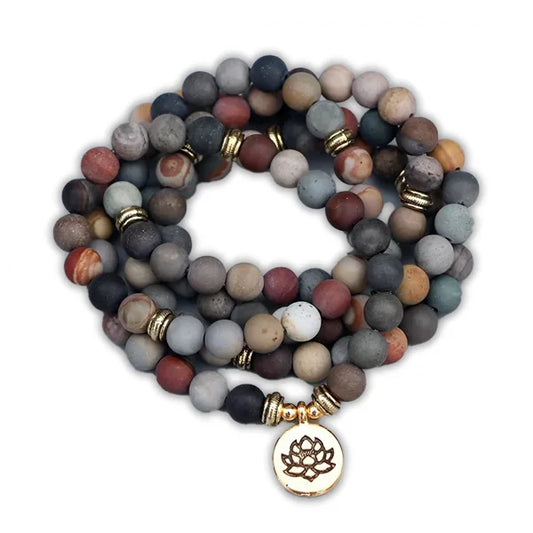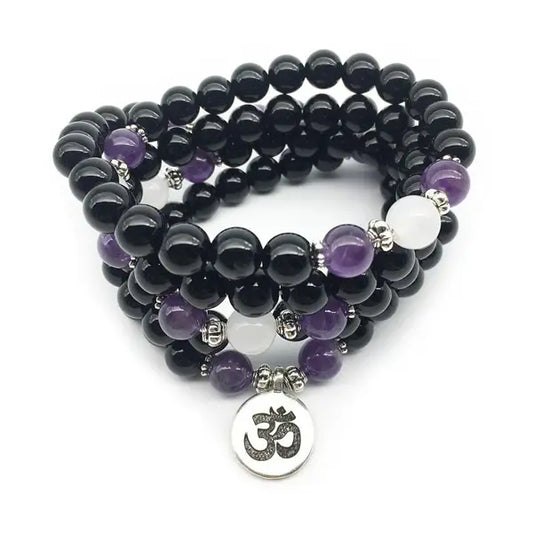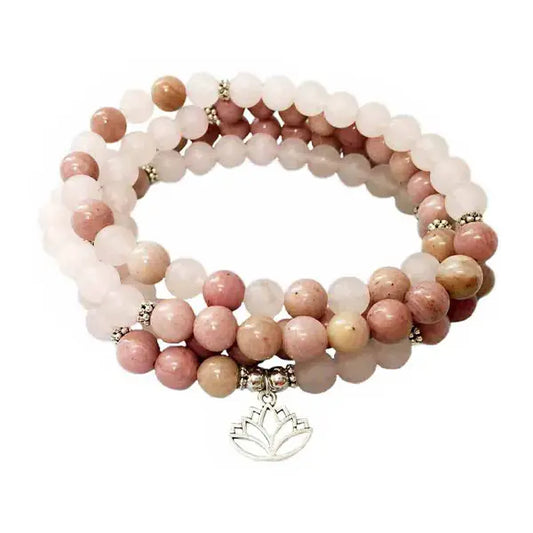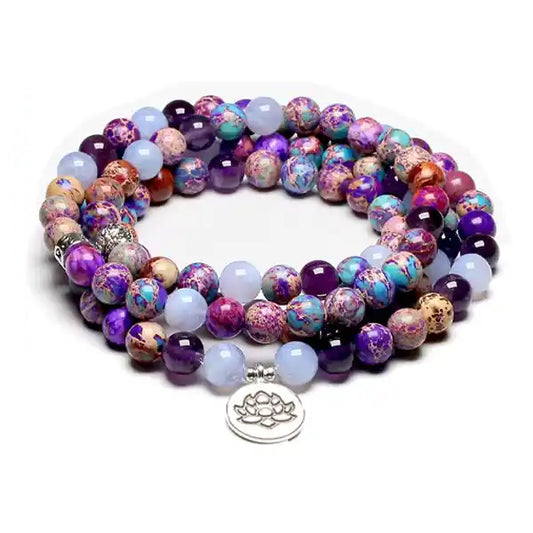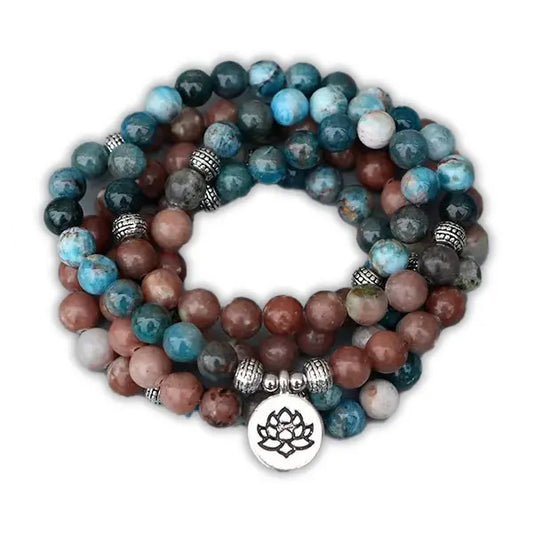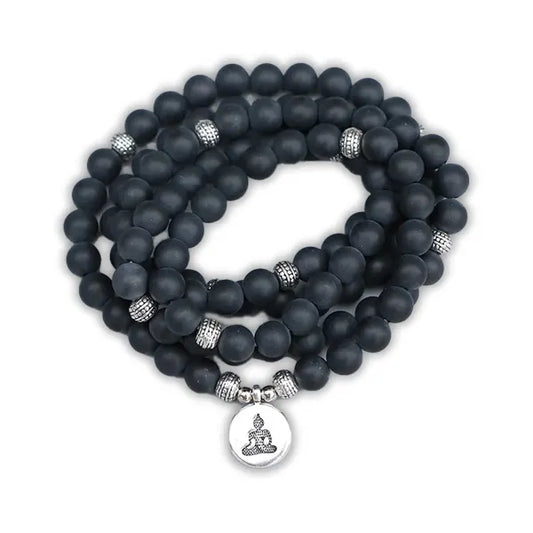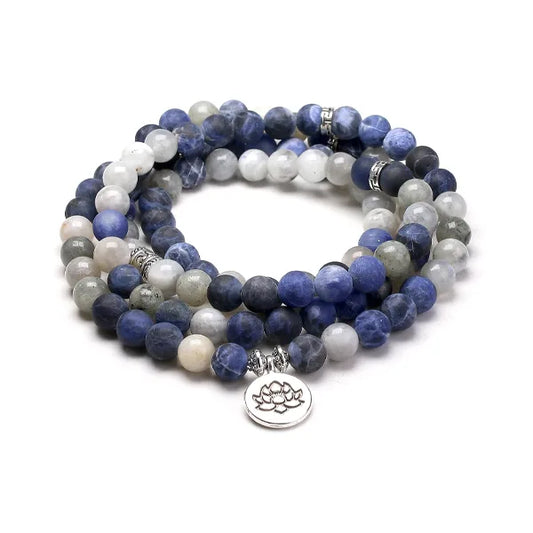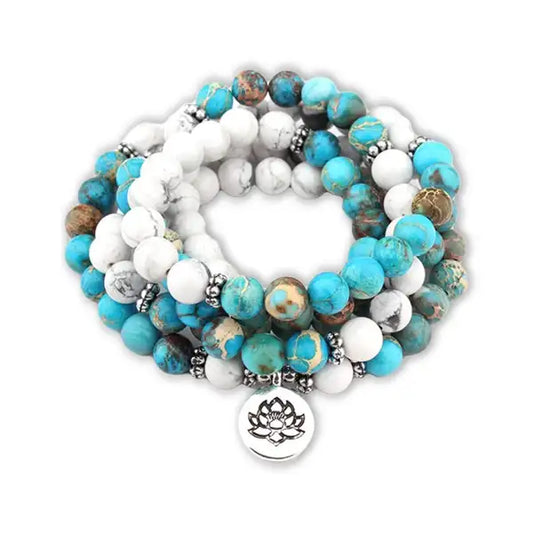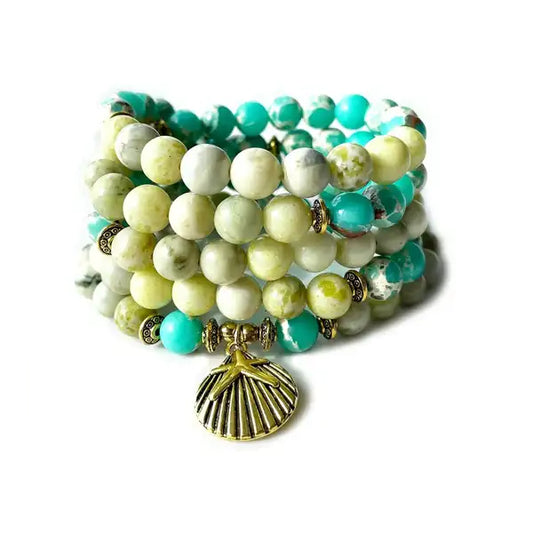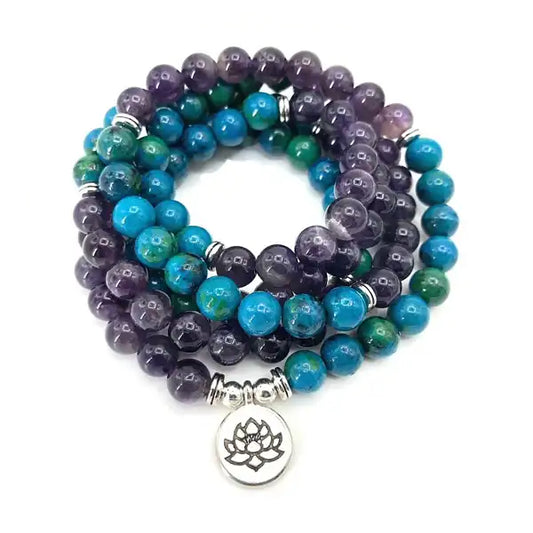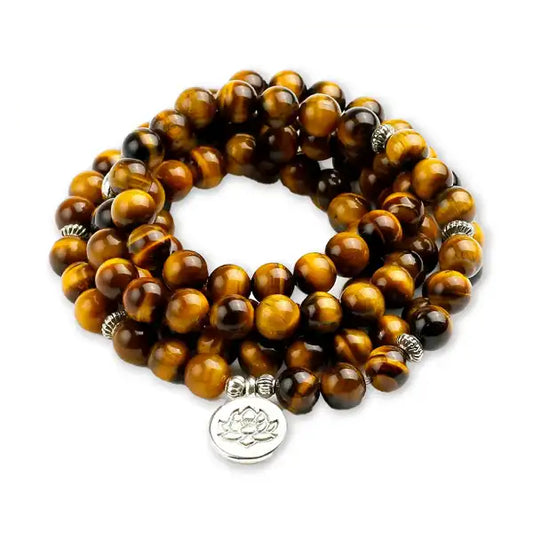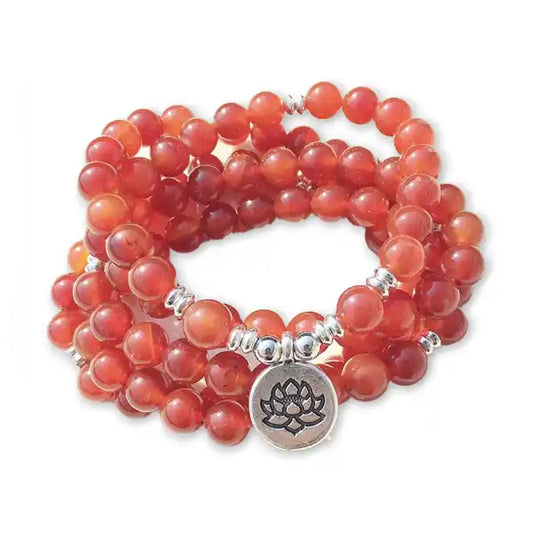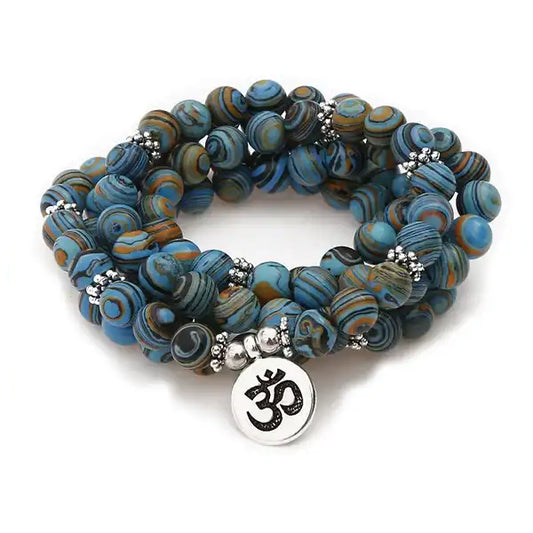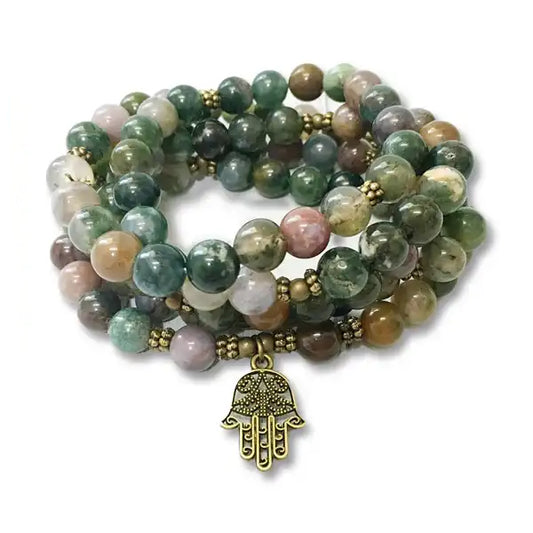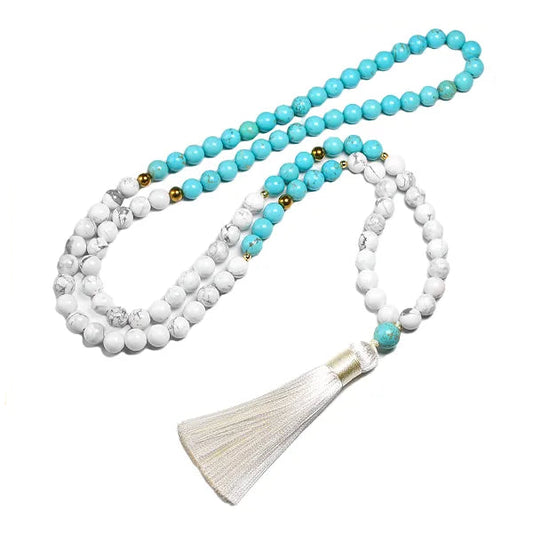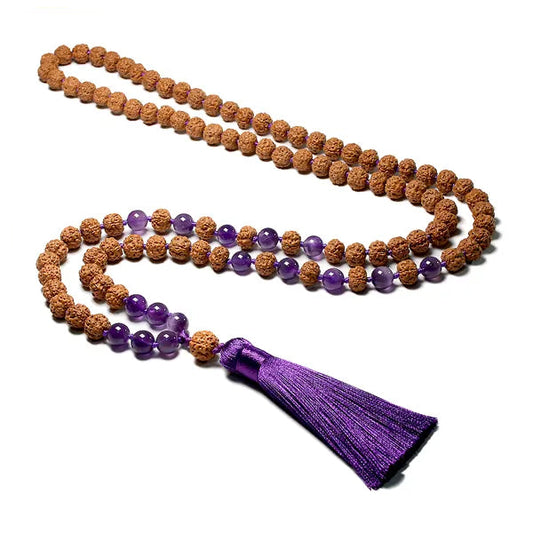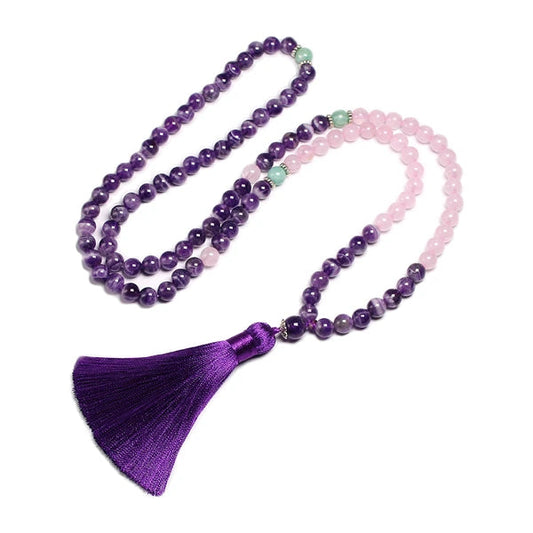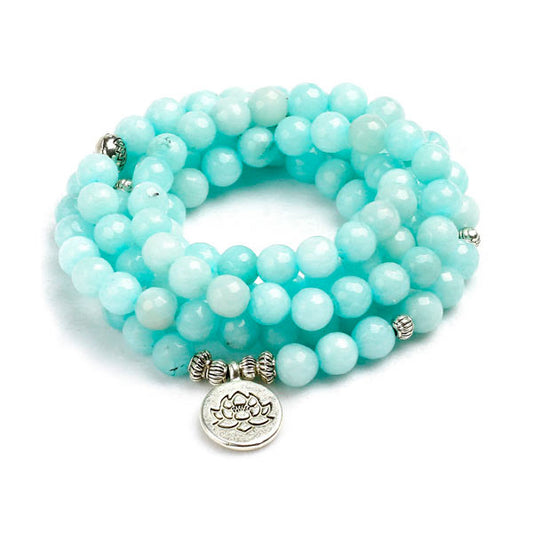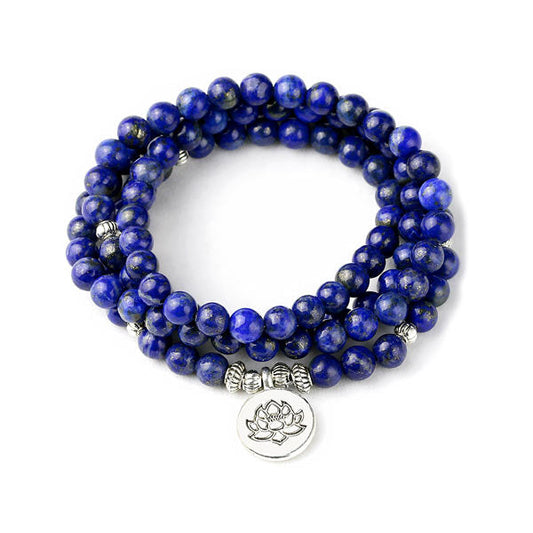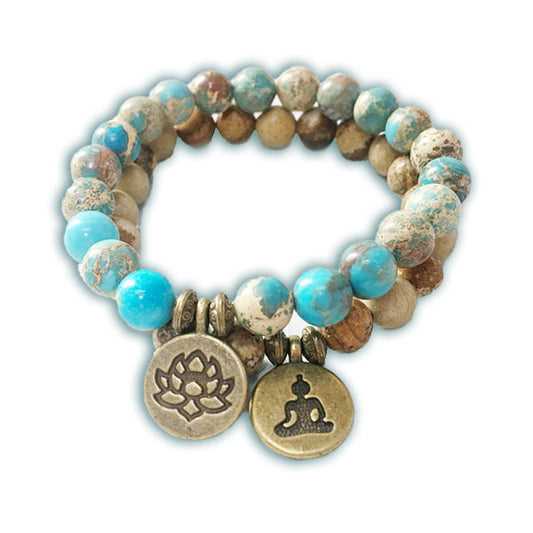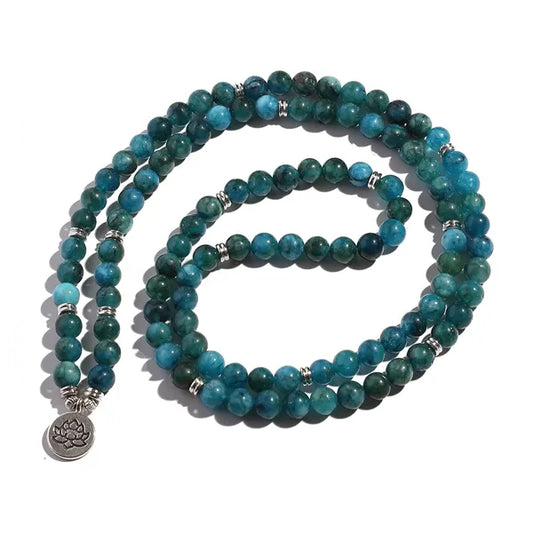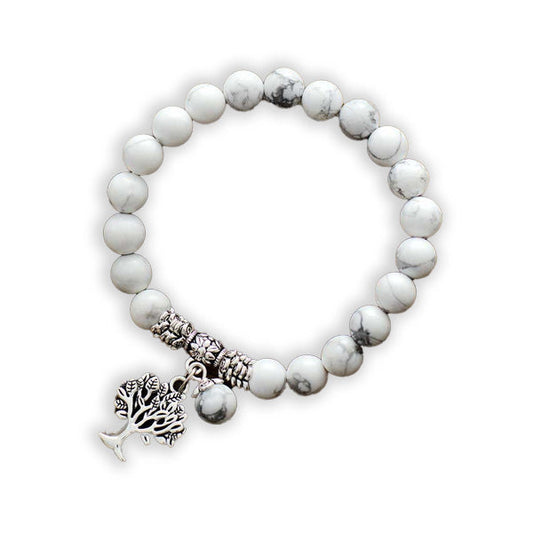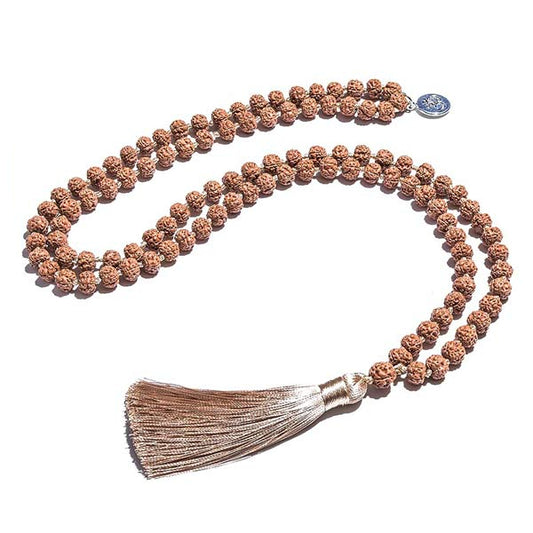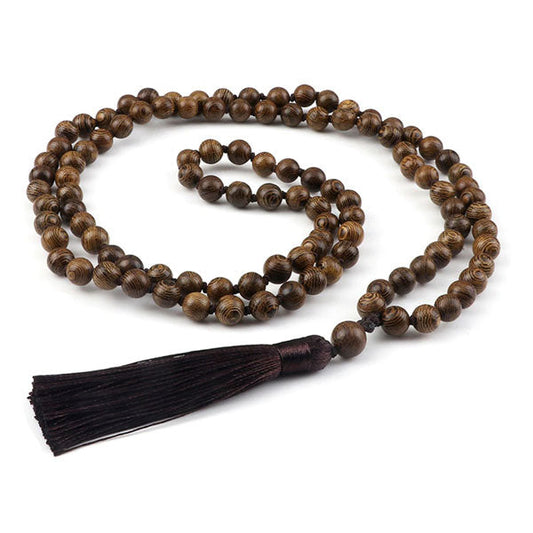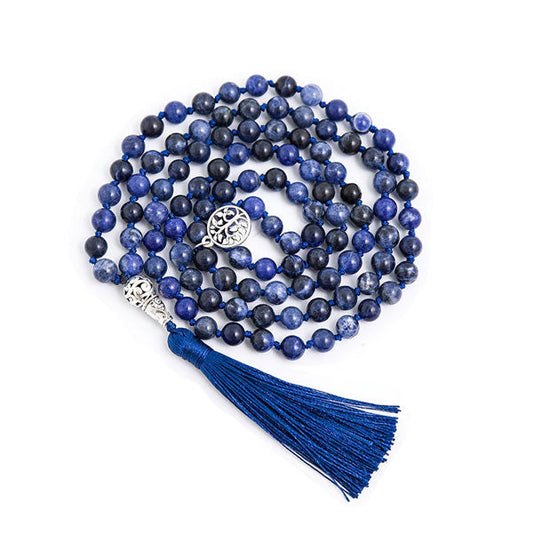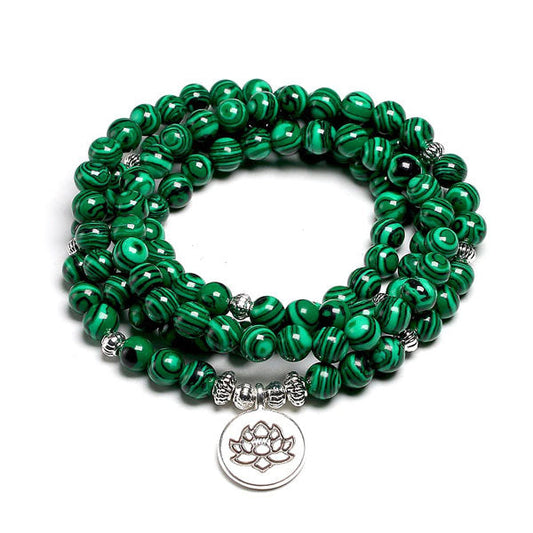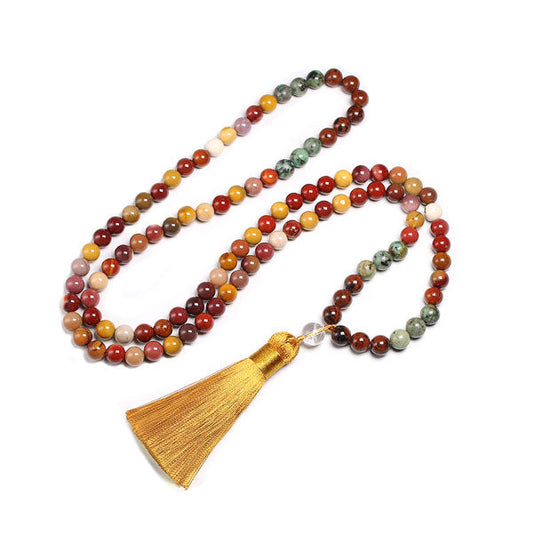Collection: Mala: bracelets and necklaces
-
Mala with 108 Apatite Rhodonite and Lotus Flower Beads
Regular price 35,00 €Regular price0,00 €Sale price 35,00 € -
108-Bead Wooden Mala with 7 Chakra Beads and Tree of Life
Regular price 18,00 €Regular price0,00 €Sale price 18,00 € -
Labradorite Tourmaline OM bracelet (8 mm ball)
Regular price 22,00 €Regular price0,00 €Sale price 22,00 € -
Mala with 108 beads, Yellow Lotus Aventurine
Regular price 26,00 €Regular price0,00 €Sale price 26,00 € -
Mala with 108 Aquamarine Lotus Beads
Regular price 24,00 €Regular price0,00 €Sale price 24,00 € -
Mala with 108 beads, Matte Polychrome Jasper Lotus
Regular price 35,00 €Regular price0,00 €Sale price 35,00 €Sold out -
Mala with 108 beads: Black Onyx, Amethyst, Om
Regular price 27,00 €Regular price0,00 €Sale price 27,00 € -
Mala 108 beads Pink Quartz Rhodochrosite Lotus
Regular price 30,00 €Regular price0,00 €Sale price 30,00 € -
Mala with 108 beads: Imperial Jasper, Amethyst, White Quartz, Lotus
Regular price 34,00 €Regular price0,00 €Sale price 34,00 € -
Mala with 108 Apatite Sunstone and Lotus Beads
Regular price 37,00 €Regular price0,00 €Sale price 37,00 €Sold out -
Mala with 108 Black Onyx Buddha Beads
Regular price 32,00 €Regular price0,00 €Sale price 32,00 € -
Mala with 108 Moonstone, Sodalite, and Lotus Beads
Regular price 30,00 €Regular price0,00 €Sale price 30,00 € -
Mala with 108 beads, Howlite Turquoise Lotus
Regular price 34,00 €Regular price0,00 €Sale price 34,00 € -
Mala with 108 beads: Green Jasper, Yellow Jasper, Shell
Regular price 35,00 €Regular price0,00 €Sale price 35,00 €Sold out -
Mala with 108 beads: Amethyst, Chrysocolla, Lotus
Regular price 30,00 €Regular price0,00 €Sale price 30,00 € -
Mala with 108 Tiger's Eye and Lotus Beads
Regular price 25,00 €Regular price0,00 €Sale price 25,00 € -
Mala with 108 Carnelian and Lotus Flower Beads
Regular price 25,00 €Regular price0,00 €Sale price 25,00 € -
Mala 108 beads Azurite Malachite Lotus OM
Regular price 25,00 €Regular price0,00 €Sale price 25,00 € -
Mala with 108 Indian Agate Khamsa beads
Regular price 30,00 €Regular price0,00 €Sale price 30,00 € -
Mala with 108 white and turquoise blue howlite beads and a pompom (8mm ball)
Regular price 25,00 €Regular price0,00 €Sale price 25,00 € -
Mala with 108 Rudraksha Seed Beads and Amethyst Tassel (9mm ball)
Regular price 28,00 €Regular price0,00 €Sale price 28,00 € -
Mala with 108 Amethyst and Rose Quartz beads and a tassel (8mm ball)
Regular price 30,00 €Regular price -
Mala 108 beads Chalcedony Lotus Flower
Regular price 27,00 €Regular price -
Mala 108 beads Lapis-Lazuli Lotus Flower
Regular price 32,00 €Regular price0,00 €Sale price 32,00 € -
Buddha Lotus Flower Jasper Bracelet Set
Regular price 23,00 €Regular price0,00 €Sale price 23,00 € -
Mala 108 beads Blue Apatite Symbol of the Lotus
Regular price 24,00 €Regular price0,00 €Sale price 24,00 € -
Tree of Life White Howlite Bracelet
Regular price 18,00 €Regular price -
Mala 108 beads Rudraksha seeds Symbol Om (Aum)
Regular price 23,00 €Regular price0,00 €Sale price 23,00 € -
Mala 108 sandalwood beads with pompom (ball 8 mm)
Regular price 17,00 €Regular price0,00 €Sale price 17,00 € -
Mala 108 Lapis Lazuli beads and tree of life symbol (8 mm ball)
Regular price 29,00 €Regular price0,00 €Sale price 29,00 € -
Mala 108 Malachite beads and Lotus symbol (ball 6 mm)
Regular price 19,00 €Regular price0,00 €Sale price 19,00 € -
Mala 108 beads Mahogany Obsidian, Mokaite Jasper, African Turquoise (8 mm ball)
Regular price 25,00 €Regular price0,00 €Sale price 25,00 €
Mala: bracelets and necklaces
What is a Mala?
Many people wear mala necklaces or bracelets; however, this trend is steeped in significant tradition and symbolism. Mala bracelets, commonly called japa malas, originated in India over 1,000 years ago and have roots in Hinduism, Buddhism, and yoga . The beads of a mala can be made of seeds, sandalwood, rosewood, or gemstones. The size of these beads varies from 6 mm to 10 mm in diameter, but most malas are made with 8 mm beads.
Using the Mala
Even if you're not a meditation practitioner, mala bracelets are an excellent tool for concentration. The mala beads help the wearer to pray ; a mala is a type of rosary with which mantras can be recited, using the beads to count the number of mantras ( a mantra is a spiritual affirmation spoken aloud ). Today, mala bracelets no longer have only religious connotations and are worn by people all over the world , belonging to many different faiths or no faith at all. You can use them in your daily life, on various occasions , such as a long work meeting, when you're stuck in traffic, or in a waiting room. A mala bracelet can help you meditate or concentrate by counting the beads in one hand.
Stones and Intentions
You can use the healing power of stones and set intentions. Stones are energetic; they attract and repel different energies . There are stones for every mental, spiritual, and physical state, such as love, healing, abundance, peace, and so on . Most stones open and rebalance the chakras. But the stone is a tool, and it's important for us to also work with it, to contribute, and to define our intention. An intention is a goal or objective . Defining our intention can be a simple thought before meditating or praying, at any time of day, stating what we want and what we wish to manifest in our lives .
Lithotherapy and colors
According to crystal healing, stones are believed to have healing properties, acting on both the physical and mental levels through vibrations . The many different types of stones have varying meanings. Each possesses a power bestowed upon it by the Earth. Some have healing properties, others bring calm to the wearer, and still others are intended to clarify the mind and allow the wearer to release negative feelings. Tibetan Buddhist beads or Buddhist prayer beads, bracelets made of gemstone beads such as tourmaline, agate, rose quartz, or jade, and many others, have been used since ancient times. You can wear your bracelet on either wrist, according to your preference. However, a general consensus is that stones worn on the left wrist are associated with receiving energy and inner aspects, while stones worn on the right wrist address issues of projection and problems external to your body and mind.
Furthermore, the color of the different stones used in making the bracelets also has a meaning . For example, light blue expresses tranquility, yellow, generous beauty, silver, deep thoughts, gold, a dreamy state, pink, eternal love, and red, courage and bravery.
The different types of Mala
Mala bracelets and necklaces were created based on the original number of 108 beads . There are full mala bracelets with 108 beads, half malas with 54 beads , and quarter malas with 27 beads . Occasionally, bracelets with 18 beads can also be found.
Meaning of the number 108
The meaning of the number 108 is open to interpretation. Over time, great spiritual and scientific relevance has been given to this number. For many, the number 108 is a sacred number. While the number 108 may seem arbitrary, it actually has great significance in mathematics, astronomy, and astrology. It is also an auspicious number that has a long history in many spiritual traditions, including those of Buddhism, Yoga, Hinduism, and Sikhism. What is most fascinating is that this magic number appears in a multitude of ancient cultures, traditions and disciplines. Although you don't have to believe in them when using prayer beads, they infuse your spiritual practice with more magic, power and intention.
Mala of 108 beads
The 108-bead Mala can be worn as a bracelet or a necklace. They are strung on a strong and durable elastic. Beads are used in japamala practice to recite mantras. A full cycle of 108 repetitions is counted on the mala so that the practitioner can focus on the sounds, vibrations and meaning of what is being said. These mala of 108 beads are sometimes finished with a pompom, often in cotton. The pompom represents the connection with the spirit. Pompoms are not only beautiful and meaningful, they can also be used to diffuse essential oils. Sometimes a beaded tie knot that hangs from the end of the mala is called either a sumeru, bindu, stupa or guru bead. This symbolizes the guru from whom the student received the mala or mantra, thus honoring the student-guru relationship. The tie knot beads are never counted as repeats, but are used as a marker for the start and end of a cycle. You can use 108 beads mala bracelet or necklace to meditate anytime and anywhere. All you have to do is choose a mantra, an intention or a prayer that you want to repeat.
Mala of 54 beads
They contain 54 beads, they are worn rolled up on the wrist, they are lighter than the original 108 bead bracelets. They can also be worn as a necklace. This style wraps 4 times on the wrist, and they can be found in several sizes. It has been an increasingly popular style over the past few years.
Mala of 27 beads
The 27-bead Mala are very practical for those who want to wear it only on the wrist and who wish to have a lighter bracelet. It adapts more easily to all wrist sizes. It is also used to count mantras during prayer or meditation.
Mala and fashion
Fashion is evolving towards a more conscious lifestyle. Mala bracelets are traditional and spiritual jewelry , but they are also aesthetically pleasing. Wearing beautiful mala bracelets will make you feel good and you will also feel the positive energy emanating from the stone or wooden beads. Today, mala bracelet designers draw inspiration from nature, urban fashion, and a certain dynamism that characterizes new styles.
Buddhist bracelets are not just beautiful pieces of jewelry worn on the wrist; they are unique forms of self-expression. The study of ancient history clearly shows that humans have worn Buddhist bracelets since time immemorial . Even today, these bracelets are used in all parts of the world. While the use of jewelry varies considerably in different regions, people from diverse cultures, countries, and religions wear Buddhist bracelets without distinction. This demonstrates the great interest and significance of Buddhist bracelets.
It's no surprise that some Buddhist bracelets feature the image of Buddha . The "Om" symbol is also associated with Buddhist jewelry. This symbol is found in both Buddhism and Hinduism. It signifies the beginning and end of all things in the universe. Many Om jewelry pieces also have Buddhist connotations. They are generally designed to represent traditional Buddhist culture and come in various sizes and shapes.
Warning
The metaphysical and healing properties described above (lithotherapy) are given for inspiration and reference, they are not scientifically proven and should be considered in the context of holistic healing and spiritual practices. We collect this information and inferred properties from writings, books, popular testimonials and various other sources. They also depend on the attitude and beliefs of the individual. Furthermore, they are not a substitute for diagnosis or treatment by a qualified therapist or physician.
Bracelets 7 Chakras
Discover our collection of 7 Chakra Bracelets .

